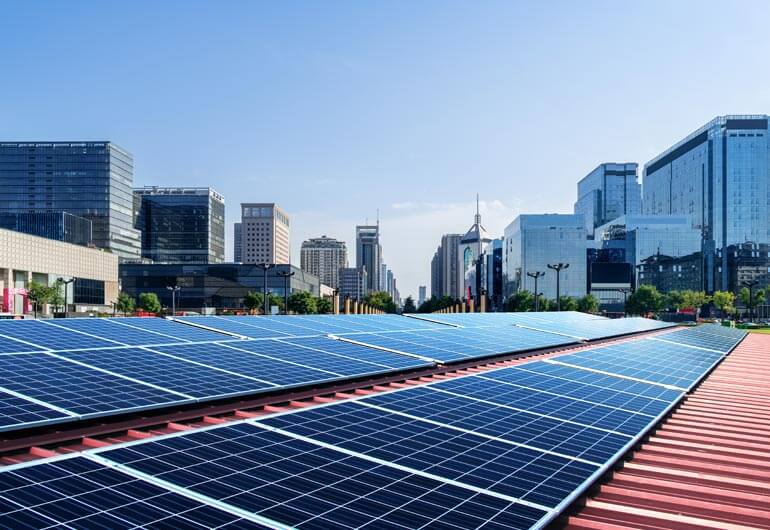In an era where businesses are increasingly focused on sustainability, commercial solar power systems have emerged as a powerful tool for reducing environmental impact and enhancing long-term profitability. Commercial solar installations not only help companies reduce their carbon footprint but also offer numerous financial benefits. In this blog, we will explore the vital connection between commercial solar and sustainability, highlighting the reasons why businesses of all sizes should consider embracing solar energy as part of their sustainability initiatives.
1. Reduction in Greenhouse Gas Emissions
One of the most immediate and impactful ways that commercial solar contributes to sustainability is by reducing greenhouse gas emissions. Traditional sources of electricity, such as coal and natural gas, release significant amounts of carbon dioxide and other pollutants into the atmosphere when generating power. In contrast, solar panels generate electricity without emitting harmful greenhouse gases, helping combat climate change and improve air quality.
2. Renewable and Clean Energy
Solar power is renewable and infinitely abundant. The sun’s energy is a clean and sustainable source of power, and harnessing it does not deplete natural resources or harm the environment. By investing in commercial solar, businesses demonstrate their commitment to using clean and renewable energy sources, which aligns with the broader goal of creating a sustainable future.
3. Energy Independence
Commercial solar installations provide businesses with a degree of energy independence. By generating their own electricity, companies become less reliant on external energy suppliers and are better prepared to weather fluctuations in energy prices. This energy independence can lead to cost savings and increased resilience, particularly during times of power outages or energy supply disruptions.
4. Cost Savings
Solar power can significantly reduce a business’s electricity bills. The energy generated by commercial solar panels can offset a substantial portion of a company’s energy consumption, resulting in ongoing cost savings. Over time, the return on investment from solar panels can be substantial, allowing businesses to allocate resources to other sustainability initiatives or growth opportunities.
5. Tax Incentives and Rebates
Government incentives, tax credits, and rebates are often available to encourage businesses to invest in solar energy. These financial incentives can significantly offset the upfront costs of installing commercial solar panels. Taking advantage of these programs can make solar power a more accessible and cost-effective option for businesses looking to reduce their environmental impact.
6. Enhanced Brand Image
Consumers are increasingly conscious of the environmental practices of the businesses they support. Investing in commercial solar power can enhance a company’s brand image and reputation by demonstrating a commitment to sustainability. A green and eco-conscious reputation can attract environmentally conscious customers and clients, potentially leading to increased sales and loyalty.
7. Competitive Advantage
Companies that embrace sustainability, including commercial solar installations, often gain a competitive advantage in their respective industries. Sustainable practices can differentiate a business from its competitors and appeal to customers who prioritize environmentally responsible companies. Being a sustainability leader can also attract top talent and investors who align with the company’s values and goals.
8. Reduced Maintenance Costs
Commercial solar power systems are relatively low-maintenance. Solar panels are designed to withstand the elements and have few moving parts, reducing the need for regular maintenance. This can lead to cost savings in terms of maintenance and repairs compared to traditional energy systems.
9. Scalability and Adaptability
Commercial solar power systems are highly scalable and adaptable to a business’s energy needs. Companies can start with a small installation and expand as their energy requirements grow. This flexibility allows businesses to tailor their solar systems to their specific operational needs, ensuring maximum energy efficiency.
10. Long-Term Sustainability Goals
Commercial solar installations align with long-term sustainability goals and commitments. As more businesses prioritize sustainability in response to global environmental challenges, integrating solar energy into their operations becomes a key strategy for achieving these goals. Solar power can be a central component of a company’s sustainability roadmap, contributing to measurable and impactful reductions in carbon emissions.
Conclusion
Commercial solar power systems play a crucial role in advancing sustainability efforts within the business world. By reducing greenhouse gas emissions, promoting clean and renewable energy, and delivering substantial cost savings, commercial solar installations offer a myriad of benefits to companies of all sizes. Beyond the immediate financial gains, businesses that embrace solar power demonstrate a commitment to environmental stewardship and set themselves apart as leaders in sustainability. The decision to invest in commercial solar is not only a smart financial move but also a powerful statement of commitment to a more sustainable future for our planet.

